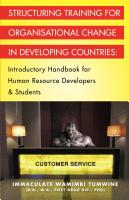| ||||||||||||
| Category: Business:Training |
(requires Adobe Reader)
|
| About the Book | |
|
Structuring Training for Organisational Change in Developing Countries: Introductory Handbook for Human Resource Developers & Students focuses on the use of structured management training to improve efficiency and effectiveness in organisations, with special focus on reducing the visible indicators of poor management in organisations in developing countries. The Handbook underlines that management training can play a positive role in reducing the visible indicators of poor management in organisations, if it is well managed and geared towards improving the quality of customer care and improving product quality. It stresses the importance of identification of visible indicators of poor management and the importance of instituting a continuous review of organisational goals/objectives, as well as constant reformulation of measurable individual and group work improvement targets. Relevant continuous management training must then be instituted with the aim of reducing the number identified visible indicators of poor management. The author observes that, in several developing countries, some organisations are performing so poorly that even a modest reduction in the number of poor performance indicators can make a significant difference. She takes the example of a city where garbage collection is not done, and a capital city where street lights continuously burn during the day-light hours. Having lights switched off during daytime entails improving the quality of staff, modifying job allocation, reorganisation of financial resource distribution, or modification of work methodology. All these would need to be supported by appropriate training. She calls for better adaptation of the appraisal system and better adaptation of the reward and dismissal procedures to reflect more closely the changing performance requirements. In light of modified performance expectations, there is need for tailored individual and group training. Among others, she calls for a training direction which moves away from the more traditional general management training, based largely on the teaching of theory, towards a more action-oriented training strategy, initially aimed at improving customer care and, subsequently, at improving the general quality of service and output, with focused attention paid to reducing the number of indicators of poor performance. The author points to some of the literature that outlines shortcomings of management training institutions in developing countries which have lessened the role that management training could play in improving organisational efficiency. The handbook gives tips on the opportunities that exist for training institutions and training units in developing countries. It argues that, to make an impact, training institutions first have to look at their own management and their own outlook as business oriented institutions. Each chapter has an introductory question to help focus readersí attention on chapter contents. This introductory handbook will be useful for students on human resource development and organisational development programmes, and for students and practitioners in the areas of training institution management. It will also help departments that are developing performance-related training, particularly in developing countries.
|
|
| Related Title | |
|
|
| About the Author | |
 |
Dr. Immaculate Wamimbi Tumwine is a Canadian, born in Uganda, where she was trainer and consultant. She has carried out international consulting and training assignments for Commonwealth Higher Education Management Service, International Telecommunications Union and United Nations Development Programme. She has: PhD, Education Management/Training; Postgrad. Dip., Education Management; MA; BA. |

